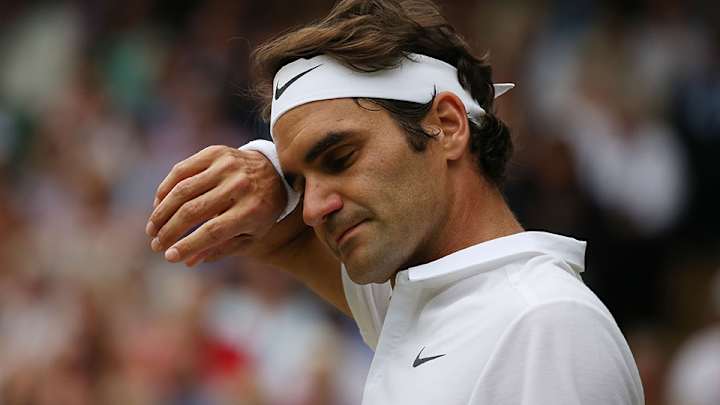Analyzing the impact of Federer's decision to end his 2016 season

Your teams. Your favorite writers. Wherever you want them. Personalize SI with our new App. Install oniOSorAndroid.
How unexpected is this announcement, less than two weeks from the start of the Olympics?
Sadly, not. Roger Federer had been remarkably clear of the injury bug for so much of his career and some combination of common sense, probability and the onslaught of time made it likely that eventually he’d get hurt. That injury happened after losing in the semifinals of the Australian Open to Novak Djokovic in the most unlikely way, when he hurt his left knee playing the role of dad.
After undergoing surgery on the knee to repair a torn meniscus, he missed most of the next several months, including the French Open. At Wimbledon he looked a little slow of foot in the first few rounds. He looked more confident in his movement in the middle rounds. But in the semifinals against MilosRaonic, he even called a trainer at one point to examine his knee, which you had virtually never seen throughout his career.
• Roger Federer, Rafael Nadal withdraw from Rogers Cup
Clearly, the fears of injury were realized. One thing about an athlete’s body: Sometimes they shake off collisions and impact that looks brutal and other times, the smallest tweak (especially when there has been a prior injury, as was the case with this) can be devastating.
Did we underestimate the seriousness of his meniscus tear?
Good question. At Wimbledon, he finished the match under his own power but that may have give people false hope. I know that the day after that match there was still much concern in the Fed camp about the state of the knee.
What does this mean for Federer’s ranking and the ATP Tour for the remainder of the season?
It’s hard to side step how distressing it is, both for Federer and candidly, for the sport. This is like Kelly Clarkson’s voice going out in the middle of the tour. Even with two semifinals appearances at Slams in 2016, he’ll drop to his lowest ranking in more than 15 years at the end of the season.
Assuming he returns in Australia in January 2017, he’s unlikely to be a top 16 seed there. But we should probably just be thankful this wasn’t a retirement announcement. At least by shutting it down for the rest of the year he’s indicated there is a next year.
According to the ATP's Greg Sharko, if Federer applies for a protected ranking he will be eligible if he remains out of competition a minimum of six months since his last event played. The protected ranking is calculated as the average ranking from the first 13 weeks he is out of competition. If he returns after six months and less than 12 months from his last event he will have a nine-month protected ranking. If he remains out of competition for a minimum of 12 months since his last event played he will have a 12 month protected ranking.
What does this mean for Federer’s career? He indicated that he is doing this in order to extend his career, but is this the beginning of the end?
We can probably safely say Federer will never win gold, which was one of his avowed goals. You also realize more than ever how much would have to go right for him to win another major. Everything he’ll do after this point will be gravy anyway, so this won’t diminish he career, but time is an unrelenting opponent.
Tennis in 2016. What do you have to say?
Can we get Hawk-Eye review in try and replay the cosmic point?

Jon Wertheim is a senior writer for Sports Illustrated and has been part of the full-time SI writing staff since 1997, largely focusing on the tennis beat , sports business and social issues, and enterprise journalism. In addition to his work at SI, he is a correspondent for "60 Minutes" and a commentator for The Tennis Channel. He has authored 11 books and has been honored with two Emmys, numerous writing and investigative journalism awards, and the Eugene Scott Award from the International Tennis Hall of Fame. Wertheim is a longtime member of the New York Bar Association (retired), the International Tennis Writers Association and the Writers Guild of America. He has a bachelor's in history from Yale University and received a law degree from the University of Pennsylvania. He resides in New York City with his wife, who is a divorce mediator and adjunct law professor. They have two children.
Follow jon_wertheim